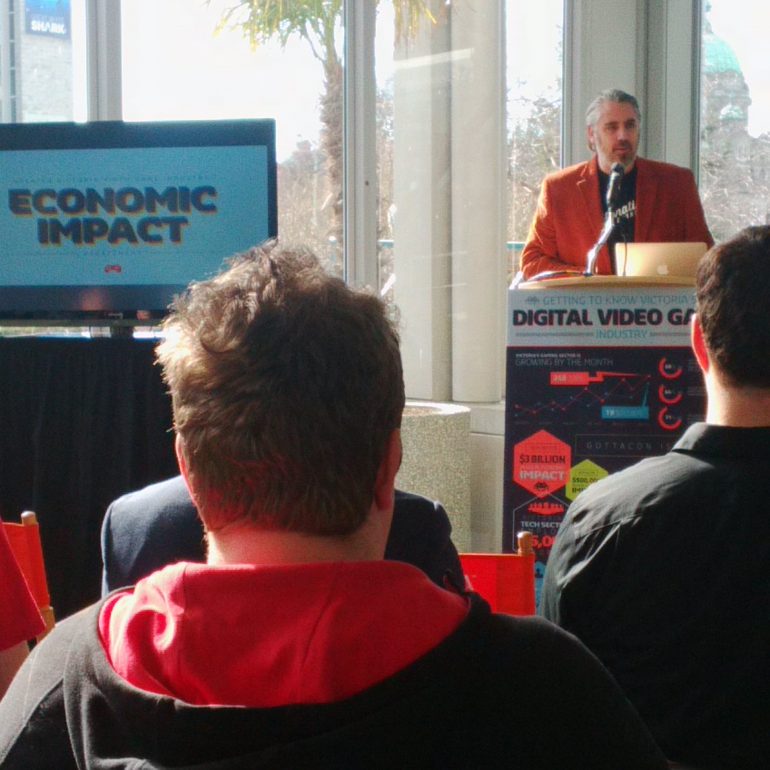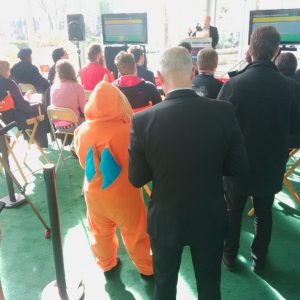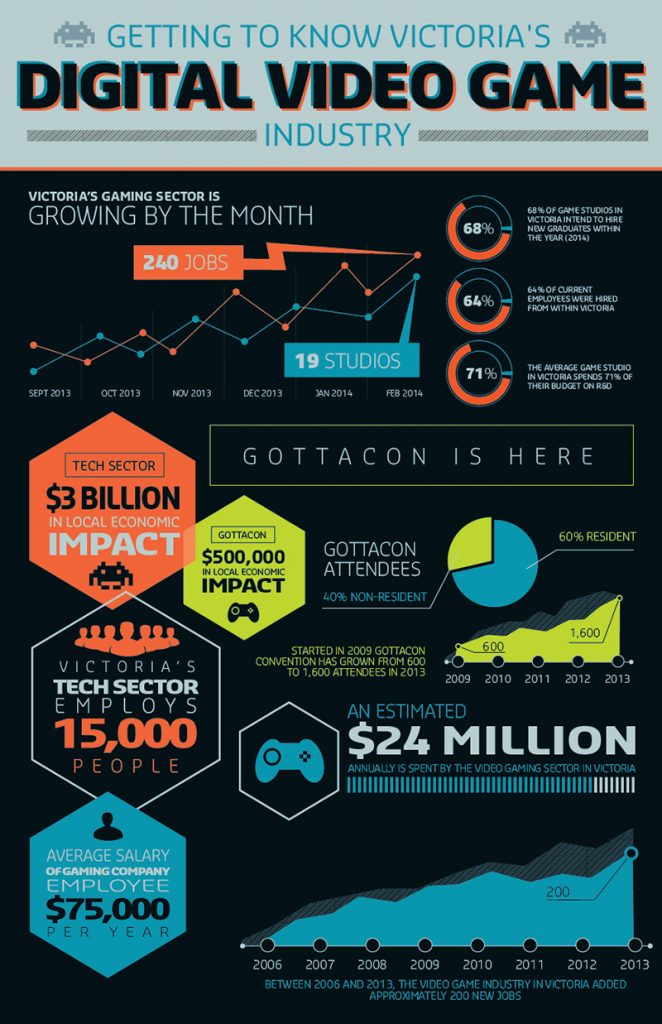It’s a city that’s viewed as pristine and proper. BC’s capital city is also seen by some as a place of the newly wed, and nearly dead. Having recently hosted the 6th annual Gottacon Convention, Victoria showed off a gaming community with a very healthy pulse.
The professional gaming convention is an international event. It attracts devotees, fans, creators and insiders for games of all genres. The conference has grown from 600 to 1,600 attendees (2013), and expected to reach 2,500 this year. “Gottacon is another important part of the thriving interactive games industry in Victoria and BC. The momentum has enabled us to recruit a number of industry veterans from EA, Microsoft, Zynga who will also be involved on panels and speaking at the conference. As a major event for local gamers, this gives us a unique opportunity to debut our next-generation action-strategy game on mobile to the very people we hope to reach when we launch,” said Alex Mendelev, CEO at TinyMob Games.
In conjunction with the event, the Victoria Advanced Technology Council (VIATeC) released an economic impact whitepaper, titled Getting Our Game On: An Impressive Growth Snapshot of Victoria’s Digital Gaming Industry. It’s based on a 2013 survey of local gaming companies. The report highlights that 19 studios are contributing 240 jobs and an estimated $24 million in local annual spending.
For every Halo, Need for Speed, Angry Birds, or Candy Crush, gaming is home to an overflowing dustbin of failed titles and studios. It’s not for the feint of heart. I spoke further with Eric Jordan, CEO of DJArts Games, about the state of the business.
What are you attributing the success of Victoria’s game industry to?
“The technology industry has been our largest industry in Victoria for many years now, employing over 15,000 people and contributing $3 billion to the local economy. As a sub-sector of the broader tech industry, the video game industry has been able to build on this success to take advantage of BC’s long time strengths in the video game industry and seize the opportunities which result from changes in the game industry (particularly the rise of social/casual and mobile).”
What are examples of locally created IP, and who’s leading the way?
“InLight Entertainment works closely with Nickelodeon and Disney to produce the majority of video game tie-ins for movies such as Toy Story, Sponge Bob, etc. Companies like Kixeye (HQ in SF, but office in Victoria) are leaders in web hardcore games like War Commander and their upcoming MOBA, Tome, Kano/Apps and DJArts Games have been very successful in reaching millions of players through Facebook and other platforms.”
What’s going on in terms of encouraging and attracting women into this space?
“The video game industry has been actively reaching out and working with local school districts and high schools to encourage female students to consider careers in video games. The most common misconception that we address is the concern that you have to be a programmer in order to work in the video game industry. This just simply is not true. The game industry employs a wide variety of people including artists, musicians, and community managers.”
What are concerns moving forward in terms of sustainability? What will contribute to this being a healthy ecosystem?
“The game industry is united in supporting the local community and tech industry. For example, we have put together a student work experience program which will provide local high school students with the opportunity to spend a week at one of the local game studios. We anticipate that over 250 students will get to experience a game studio per school year. During their week with the company, they get to learn about what the office environment is like, how the various aspects of the games are created (design, programming, art, writing), how we manage our communities and run our businesses. The average student has spent over 10,000 hours playing video games by the time that they graduate from high school, so not only do the students benefit from the work experience, but the companies also benefit from the rich experience that these students bring. Students just need to remember to bring their nerf gun for the first day of work!”
What role do you see the government playing in helping the industry? Is government doing enough, or should the government just stay out of the way?
“The video game industry has grown significantly in Victoria since 2008. A key element of this growth was the introduction of the Interactive Digital Media Tax Credit (IDMTC) in 2010. The IDMTC provides a 17.5 percent tax credit which has been very important in helping local companies build. Sadly, the IDMTC is significantly lower than the comparable support provided in Quebec (26.5-30 percent) and Ontario (35-40 percent). Also the IDMTC is set to expire in 2015. The video game industry strongly believes that the continuation of this credit is required to continue to support the growth of the video game industry in Greater Victoria.”
Dan Gunn, is VIATeC’s executive director, and representative of the very strong pulse found in Victoria. As he pointed out “a thriving technology industry in Victoria is good for local university and college graduates, providing high paying local jobs so they don’t seek jobs elsewhere upon graduation. We look forward to seeing the video game sector continue to grow, and become a significant portion of the local tech industry.”




